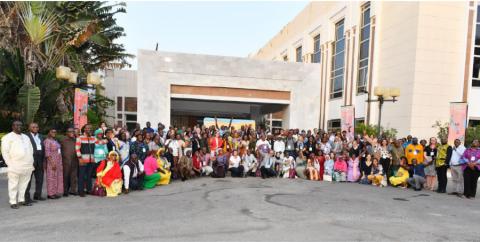
The West African Health Organization participated in the regional consultation entitled "Every Woman, Every Newborn, Everywhere" (EWENE) and "Action for Child Survival" (CSA) held in Dakar, Senegal, from 19 to 22 November 2024.
Organized by UNICEF, WHO, UNFPA and UN Women, in partnership with key actors such as USAID, the French Muskoka Fund, the GFF and the Gates Foundation, the meeting brought together representatives from ministries of health from 24 countries in the West and Central Africa region, as well as technical and financial partners.
The main objective of this consultation was to define concrete and priority actions to reduce avoidable maternal, newborn and child mortality in the region by 2030, in line with the targets of Sustainable Development Goals (SDGs) 3.1 and 3.2. The consultation specifically aimed to share progress in the coverage and quality of key interventions for maternal, newborn and child health, disseminate recent technical and programmatic approaches to improve services, exchange national experiences, identify barriers to overcome, and define priority actions accompanied by a monitoring and evaluation framework to measure progress.
UNICEF Regional Director for West and Central Africa, Mr. Gilles FAGNINOU recalled that this initiative is part of global efforts to achieve the Sustainable Development Goals. He stressed the urgency of accelerating progress by mobilizing adequate resources, strengthening collaboration among partners and placing health systems at the heart of national priorities. According to him, achieving targets 3.1 and 3.2 requires a multi-sectoral, inclusive and evidence-based approach.
The WHO Representative highlighted the importance of an integrated and coordinated approach, combining strengthening health systems, training professionals, and improving access to essential services. She stressed that solutions must be adapted to local contexts, taking into account existing disparities and engaging all stakeholders in a process of co-creation and pooling of resources.
Dr. Samba CORSA, Chief of Staff of the Ministry of Health and Social Action of Senegal, representing the Minister of Health, opened the consultation by emphasizing the persistent challenges in the region. He referred to the main causes of the high rates of maternal and infant mortality, including the lack of qualified health personnel, lack of access to essential medicines and the adverse effects of malnutrition among others. He called for focusing efforts on high-impact interventions and relying on scientific evidence to improve primary health care, a fundamental pillar for reducing preventable mortality.
During this consultation, participants identified a list of clear, validated and applicable priority actions to accelerate the reduction of maternal, newborn and child mortality. A monitoring and evaluation framework was developed to measure progress, and best practices and lessons learned were shared among participating countries. The consultation also strengthened collaboration and coherence among development partners to ensure a coordinated and effective approach to the implementation of high-impact interventions.
At the end of this consultation, participants renewed their commitment to work together to translate these recommendations into concrete and measurable actions, thereby helping to save lives and strengthen health systems across the West and Central Africa region.
About EWENE and CSA
EWENE (Every Woman, Every Newborn, Everywhere) and CSA (Action for Child Survival) are regional initiatives aimed at reducing preventable maternal, newborn and child mortality in West and Central Africa. These programs emphasize evidence-based interventions and strengthened collaboration to achieve the Sustainable Development Goal targets by 2030.
About WAHO
The West African Health Organization (WAHO) is ECOWAS' specialized agency in the field of health. Its mission is to achieve the highest possible standards and protect the health of the populations of the West African sub-region. Through collaboration with Member States and partners, WAHO works to harmonize policies, pool resources, and collectively respond to health challenges in the region.
